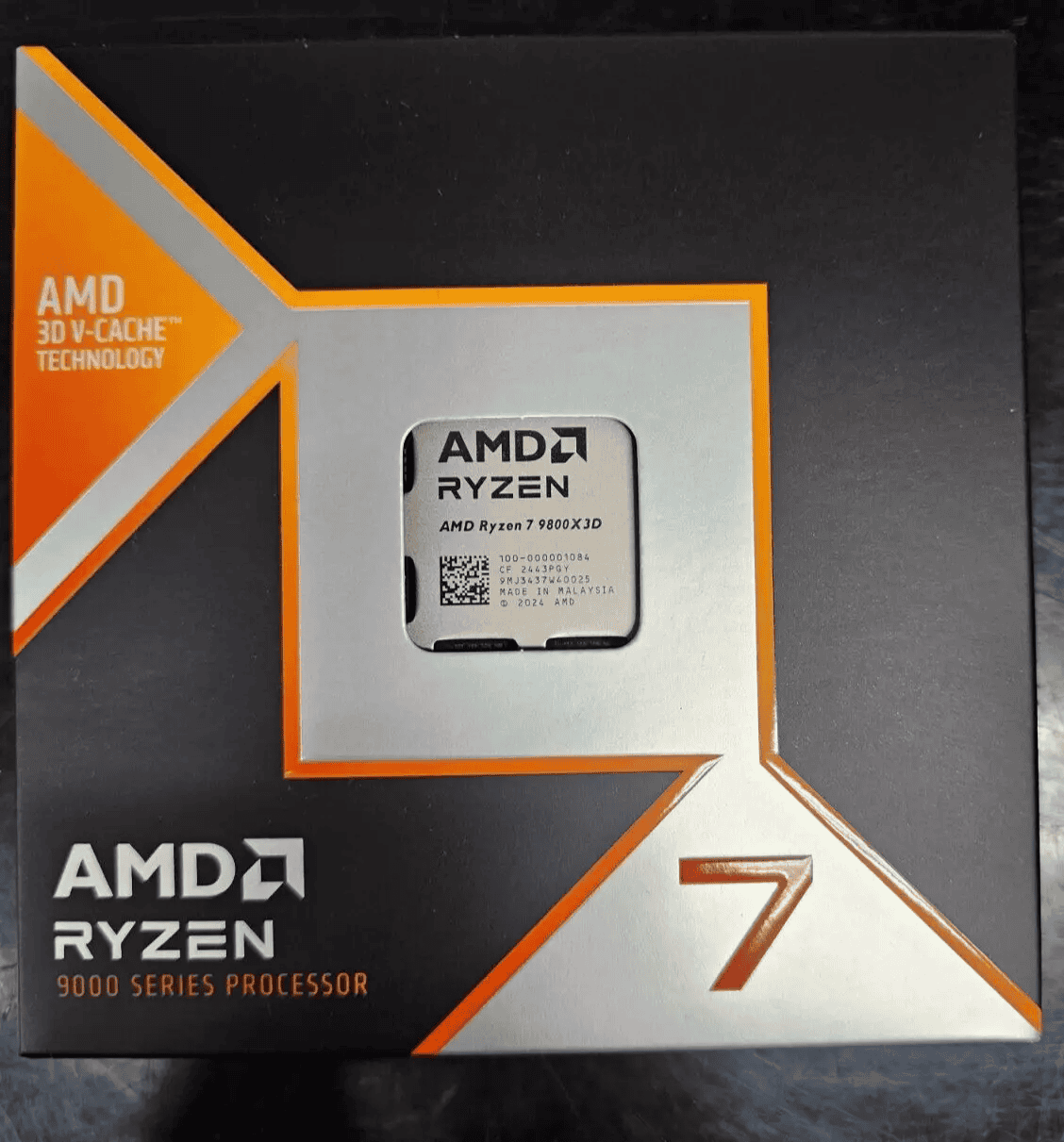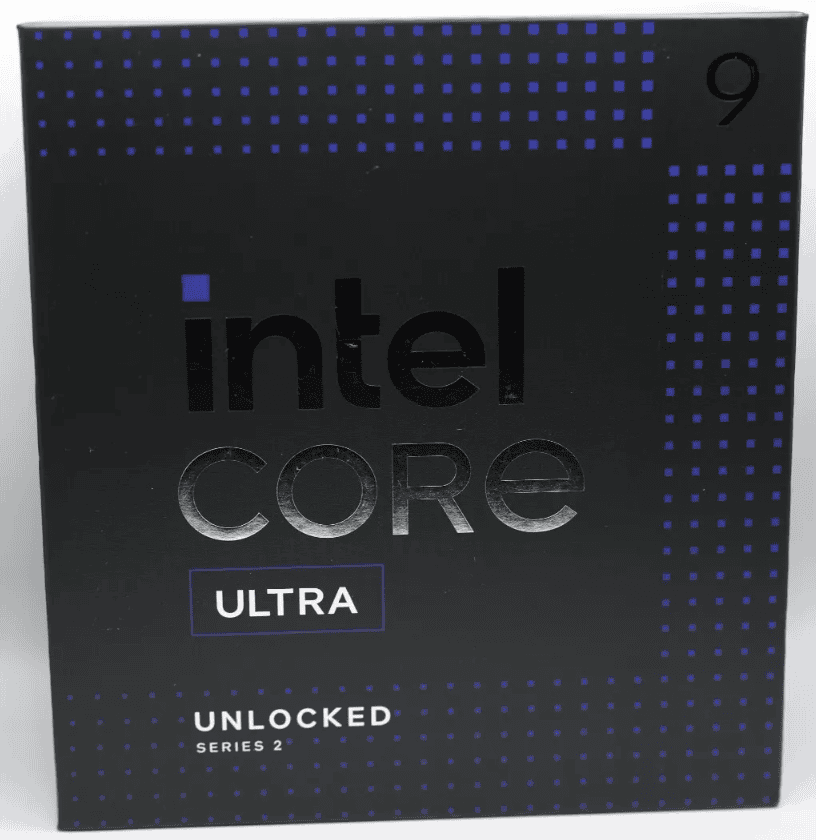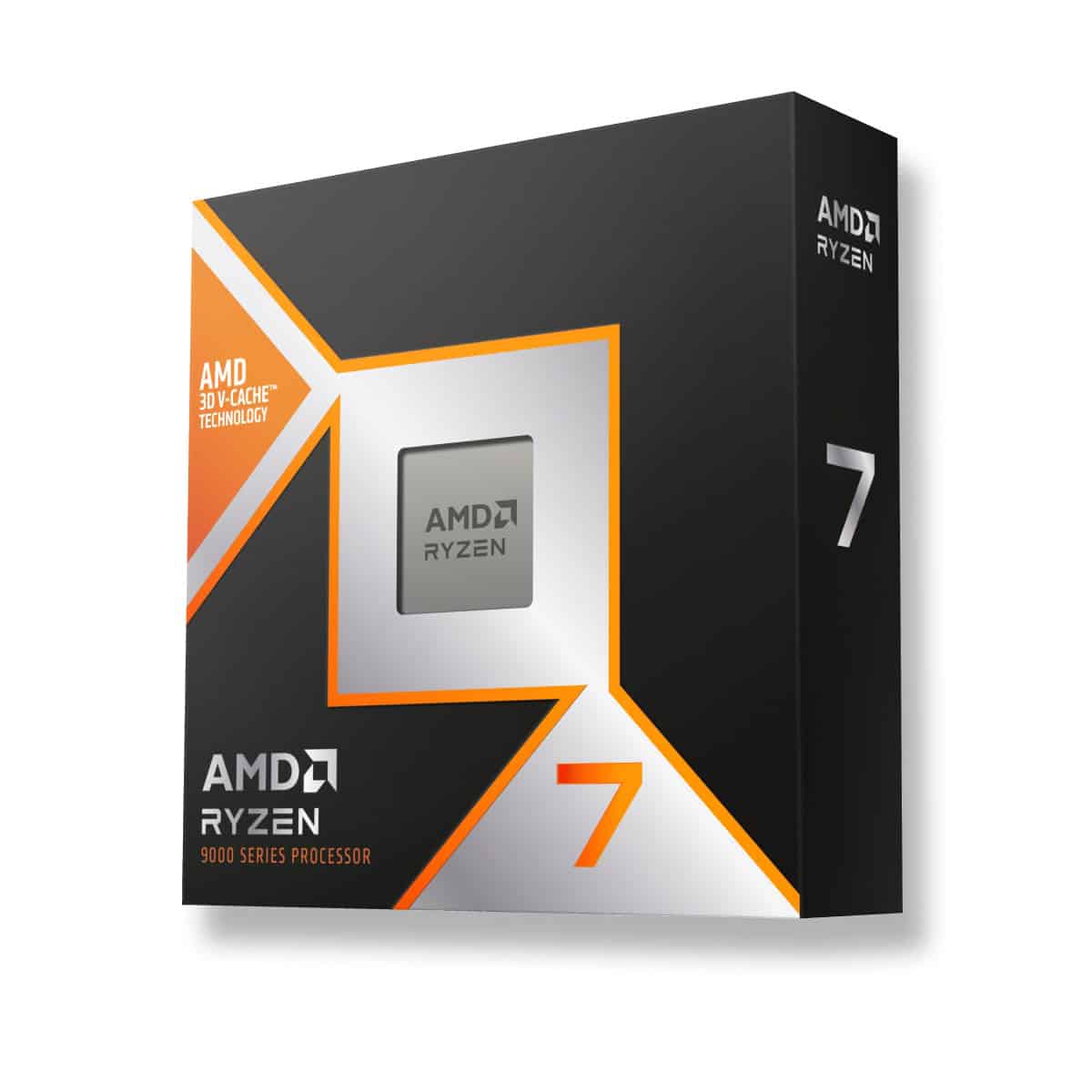In 2025, the gaming CPU market will continue to be led by AMD, which is expected to gain market share thanks to its X3D lineup and Zen 5 processors featuring 3D V-Cache. So far, the Zen 5 series has demonstrated superior performance and efficiency compared to Intel’s new 15th-generation Arrow Lake chips.
While Intel’s chips are designed to prioritize impressive power efficiency and versatility for mobile players and content creators, the competition between these two companies has sparked significant advancements in performance. Technologies like DDR5 and PCIe 5.0 have become mainstream as a result. Choosing the right CPU is essential for optimizing your gaming setup’s performance without overspending.

Best CPU for Gaming in 2025: Top 10 Picks
- AMD Ryzen 7 9800X3D
- Why #1? Outstanding gaming performance with Zen 5 architecture and 3D V-Cache technology delivering exceptional frame rates and low latency.
- Intel Core Ultra 9 285K
- Combines high clock speeds with Arrow Lake microarchitecture for a balance of power and efficiency, excelling in gaming and productivity.
- AMD Ryzen 9 9950X
- Designed for multitasking and high-end gaming, it features Zen 5 architecture with enhanced cores and threads.
- Intel Core Ultra 7 275K
- Offers excellent gaming value with a strong mix of performance cores and energy-efficient architecture.
- AMD Ryzen 5 7800X3D
- A more affordable 3D V-Cache CPU for gamers prioritizing performance on a budget.
- Intel Core Ultra 5 265K
- Mid-range Arrow Lake processor with impressive gaming capabilities and power efficiency.
- AMD Ryzen 7 9700
- High-performing Zen 5 processor tailored for gaming and content creation.
- Intel Core i7-14700K
- Slightly older but reliable, with great gaming performance at a reasonable price point.
- AMD Ryzen 9 9900
- Powerful multi-core CPU designed for demanding tasks, including high-resolution gaming.
- Intel Core i5-14600K
- Best for budget-conscious gamers seeking solid performance without breaking the bank.

Best CPUs for Gaming in 2025: Comparison Table
| Rank | CPU | Architecture | Cores/Threads | Base Clock (GHz) | Boost Clock (GHz) | TDP (W) | Price (USD) |
|---|---|---|---|---|---|---|---|
| 1 | AMD Ryzen 7 9800X3D | Zen 5 with 3D V-Cache | 8/16 | 4.7 | 5.6 | 120 | $479 |
| 2 | Intel Core Ultra 9 285K | 15th Gen Arrow Lake | 16/32 | 4.8 | 6.0 | 150 | $699 |
| 3 | AMD Ryzen 9 9950X | Zen 5 | 16/32 | 4.5 | 5.8 | 170 | $699 |
| 4 | Intel Core Ultra 7 275K | 15th Gen Arrow Lake | 12/24 | 4.6 | 5.9 | 140 | $549 |
| 5 | AMD Ryzen 5 7800X3D | Zen 5 with 3D V-Cache | 6/12 | 4.5 | 5.3 | 105 | $449 |
| 6 | Intel Core Ultra 5 265K | 15th Gen Arrow Lake | 10/20 | 4.4 | 5.5 | 125 | $399 |
| 7 | AMD Ryzen 7 9700 | Zen 5 | 8/16 | 4.5 | 5.0 | 120 | $429 |
| 8 | Intel Core i7-14700K | Raptor Lake Refresh | 8/16 | 4.7 | 5.3 | 125 | $349 |
| 9 | AMD Ryzen 9 9900 | Zen 5 | 12/24 | 4.4 | 5.7 | 170 | $649 |
| 10 | Intel Core i5-14600K | Raptor Lake Refresh | 6/12 | 4.2 | 5.0 | 125 | $299 |
AMD Ryzen 7 9800X3D: The Top Performer
The AMD Ryzen 7 9800X3D stands out as the best gaming CPU of 2025. Powered by Zen 5 architecture and 3D V-Cache technology, it delivers unparalleled frame rates and low latency for a smooth gaming experience. Its 8-core, 16-thread configuration ensures excellent performance in both gaming and multitasking, making it a strong contender for gamers who want the best.
Intel Core Ultra 9 285K: Best for High-End Gamers
Intel’s Core Ultra 9 285K leverages the Arrow Lake architecture to provide exceptional gaming performance. With 16 cores and 32 threads, it offers high clock speeds and efficient power management. It’s an excellent choice for gamers who also require a CPU capable of handling intensive tasks like video editing and 3D rendering.
Pros
- Top-tier gaming performance
- Great for multitasking
- Arrow Lake architecture is energy-efficient
Cons
- Expensive
- Requires a high-end cooling solution
AMD Ryzen 5 7800X3D: Best Value for Budget Gamers
The Ryzen 5 7800X3D provides excellent gaming performance at a more affordable price. Its 6-core, 12-thread configuration, combined with 3D V-Cache, ensures a competitive edge in games without straining your wallet.
Performance Table
| Rank | CPU | Cores/Threads | Base Clock (GHz) | Boost Clock (GHz) | TDP (W) | Price (USD) |
|---|---|---|---|---|---|---|
| 1 | AMD Ryzen 7 9800X3D | 8/16 | 4.7 | 5.6 | 120 | $479 |
| 2 | Intel Core Ultra 9 285K | 16/32 | 4.8 | 6.0 | 150 | $699 |
| 3 | AMD Ryzen 9 9950X | 16/32 | 4.5 | 5.8 | 170 | $699 |
| 4 | Intel Core Ultra 7 275K | 12/24 | 4.6 | 5.9 | 140 | $549 |
| 5 | AMD Ryzen 5 7800X3D | 6/12 | 4.5 | 5.3 | 105 | $449 |
Should You Upgrade?
Upgrading to a 2025 gaming CPU depends on your current hardware and gaming needs. If you own a recent mid-range or high-end CPU, such as a Ryzen 5800X3D or Intel 13th Gen i7, the performance gains may not justify the cost unless you’re playing at high resolutions or refresh rates. However, if your system is running an older processor or you’re planning a complete overhaul, the new options in 2025 deliver significant performance improvements, particularly for demanding titles.
Cooling and Power Considerations
High-performance CPUs like the Ryzen 7 9800X3D and Core Ultra 9 285K require effective cooling solutions and adequate power supplies. Ensure your system includes a compatible cooler and a power supply with sufficient wattage to handle the CPU and other components.
Future-Proofing Your Gaming Setup
When choosing a CPU, it’s essential to consider future-proofing. Both AMD and Intel have introduced new socket designs in recent years, so ensure your motherboard supports your chosen CPU and offers upgrade paths for future releases. Additionally, look for features like DDR5 support and PCIe 5.0 compatibility to maximize your investment.
Budget Gaming CPU Options For 2025
For top-tier gaming performance, the AMD Ryzen 5 9600X and Intel Core i5-14600K are excellent choices. These processors offer great value for their price, easily handling modern games while also supporting heavy workloads. Budget-conscious gamers might consider the AMD Ryzen 5 5600G, which includes integrated graphics. This feature can save you money by eliminating the need for a separate GPU. It’s a solid option for entry-level gaming PCs or for those looking to build a compact system.
| CPU Model | Cores/Threads | Base Clock | Boost Clock | TDP |
|---|---|---|---|---|
| AMD Ryzen 5 9600X | 6/12 | 3.7 GHz | 4.8 GHz | 105W |
| Intel Core i5-14600K | 6+8/20 | 3.5 GHz | 5.3 GHz | 125W |
| AMD Ryzen 5 5600G | 6/12 | 3.9 GHz | 4.4 GHz | 65W |
Evolution of CPU Architectures
CPU architectures continue to advance rapidly. New designs bring significant performance gains and efficiency improvements for gamers and enthusiasts.
Zen 4 to Zen 5 Transition
AMD’s Zen 5 microarchitecture marks a major leap forward. It builds on Zen 4’s strengths while introducing key enhancements. Zen 5 CPUs are expected to offer up to 25% higher instructions per clock (IPC) compared to Zen 4. This translates to substantial performance boosts in gaming and other tasks.
The new architecture also improves power efficiency. You’ll likely see longer battery life in laptops and lower power consumption in desktops. Zen 5 introduces advanced AI acceleration capabilities. This could enhance gaming experiences through better NPCs and more realistic physics.
AMD plans to launch Zen 5 processors in late 2024 or early 2025. They’ll compete directly with Intel’s latest offerings.
Raptor Lake Refresh and Beyond
Intel’s Raptor Lake Refresh improves on the original Raptor Lake design. It offers modest clock speed increases and optimizations. The real excitement lies in Intel’s upcoming architectures.
Arrow Lake is set to debut in late 2024. It promises significant IPC gains and improved efficiency. You can expect better gaming performance across the board. Intel is also working on enhanced AI capabilities to rival AMD’s offerings.
| Architecture | Expected Release | Key Features |
|---|---|---|
| Raptor Lake Refresh | Late 2023 | Modest clock speed increases |
| Arrow Lake | Late 2024 | Major IPC gains, improved efficiency |
| Lunar Lake | 2025 | Further IPC improvements, advanced AI |
Lunar Lake, planned for 2025, will likely bring another round of improvements. Intel aims to regain its performance crown in gaming and other high-demand tasks.
Future-Proofing with PCIe 5.0 and DDR5 Memory
PCIe 5.0 and DDR5 memory are becoming standard features in new CPU generations. These technologies offer significant bandwidth improvements over their predecessors.
PCIe 5.0 doubles the bandwidth of PCIe 4.0. This allows for faster SSDs and GPUs. You’ll experience quicker game load times and smoother gameplay with high-end graphics cards.
DDR5 memory brings higher speeds and improved efficiency. It enables faster data transfer between your CPU and RAM. This can lead to better performance in memory-intensive games and applications.
Investing in a CPU with PCIe 5.0 and DDR5 support helps future-proof your system. You’ll be ready for upcoming high-speed storage devices and memory modules.
Key Components for Gaming CPUs
Gaming CPUs need specific features to deliver top performance. These components work together to provide smooth gameplay and handle demanding tasks.
Importance of Core Count and Clock Speed
Core count and clock speed are crucial for gaming CPUs. More cores allow for better multitasking and improved performance in games that use multiple threads. A higher core count helps with background tasks like streaming or recording gameplay.
Clock speed affects how quickly a CPU can process instructions. Higher clock speeds generally lead to better gaming performance, especially in games that rely heavily on single-threaded performance.
Modern gaming CPUs often feature a mix of efficiency and performance cores. Performance cores handle demanding tasks, while efficiency cores manage background processes. This combination optimizes power usage and overall system performance.
Relevance of Integrated Graphics and L3 Cache
Integrated graphics can be useful for entry-level gaming or as a backup if your dedicated GPU fails. However, serious gamers typically rely on discrete graphics cards for better performance.
L3 cache plays a significant role in gaming performance. A larger L3 cache can reduce latency and improve frame rates in many games. The Ryzen 7 7800X3D is known for its large L3 cache, which contributes to its excellent gaming performance.
Here’s a comparison of L3 cache sizes in popular gaming CPUs:
| CPU Model | L3 Cache Size |
|---|---|
| Ryzen 7 7800X3D | 96MB |
| Core i5-14600K | 24MB |
| Ryzen 5 5600G | 16MB |
Balancing TDP and Power Consumption
TDP (Thermal Design Power) and power consumption are important factors to consider when choosing a gaming CPU. Higher TDP often correlates with better performance but also increased power draw and heat output.
Efficient power management is crucial for maintaining stable performance during long gaming sessions. CPUs with lower power consumption can help reduce electricity costs and may require less robust cooling solutions.
When selecting a CPU, consider your cooling setup and power supply capacity. High-performance CPUs may need more advanced cooling systems to prevent thermal throttling and maintain peak performance.
Top Gaming CPUs of 2025
The gaming CPU landscape in 2025 offers powerful options for every budget and need. Intel and AMD continue to push performance boundaries, delivering impressive chips for both budget-conscious gamers and enthusiasts seeking top-tier performance.
Best Budget Gaming CPU
The AMD Ryzen 5 8600G stands out as an excellent budget choice for gamers in 2025. This processor combines strong CPU performance with integrated graphics, making it ideal for entry-level gaming PCs.
Key features:
- 6 cores and 12 threads
- Integrated Radeon graphics
- Affordable price point
The 8600G handles 1080p gaming well in many titles without a dedicated GPU. This saves you money on your initial build. You can always add a graphics card later for more performance.
For slightly more power, consider the Intel Core i5-14400F. It lacks integrated graphics but offers better gaming performance when paired with a discrete GPU.
Best High-End CPU for Gaming Enthusiasts
The Intel Core i9-14900K reigns supreme for enthusiast-level gaming in 2025. This powerhouse CPU delivers unmatched performance for high-refresh-rate gaming and streaming.
Specs:
- 24 cores (8 P-cores, 16 E-cores)
- 32 threads
- Up to 5.8 GHz boost clock
The 14900K excels in both single-threaded and multi-threaded tasks. This makes it ideal for gaming, content creation, and multitasking. Its high clock speeds ensure smooth gameplay in CPU-intensive titles.
For those preferring AMD, the Ryzen 9 8950X offers similar top-tier performance. It boasts excellent multi-core performance for streamers and content creators.
Intel vs. AMD: The Gaming CPU Showdown
In 2025, both Intel and AMD offer compelling options for gamers. Intel generally holds a slight edge in pure gaming performance. AMD often provides better value and multi-tasking capabilities.
| Brand | Pros | Cons |
|---|---|---|
| Intel | Higher single-core performance | Higher power consumption |
| Better gaming framerates | More expensive cooling solutions | |
| AMD | Excellent multi-core performance | Slightly lower gaming performance |
| More affordable | Fewer CPU options |
Intel’s 14th-gen CPUs lead in most gaming benchmarks. The Core i5-14600K offers a great balance of price and performance for most gamers.
AMD shines in productivity tasks and value. The Ryzen 7 8700X provides strong gaming performance and excels in multi-threaded workloads. It’s an excellent choice for gamers who also stream or edit videos.
Your choice ultimately depends on your specific needs and budget. Both brands offer CPUs capable of delivering smooth, high-framerate gaming experiences in 2025.
Maximizing Gaming Performance
Optimizing your gaming CPU’s performance involves careful attention to overclocking, cooling, companion hardware selection, and system configuration. These factors work together to squeeze every bit of power from your gaming rig.
Optimizing Overclocking and Cooling
Overclocking can boost your CPU’s performance beyond its stock settings. Start by researching your CPU’s overclocking potential and safe voltage limits. Gradually increase clock speeds and test stability with benchmark tools.
Proper cooling is crucial for overclocked CPUs. Consider upgrading to a high-performance air cooler or all-in-one liquid cooling solution. Apply quality thermal paste between the CPU and cooler for optimal heat transfer.
Monitor temperatures closely during overclocking. Stay within safe thermal limits to prevent throttling or damage. Aim for temperatures below 80°C under full load for most gaming CPUs.
Choosing the Right Companion Hardware
Your CPU’s performance relies on supporting components. Pair it with a compatible motherboard that offers robust power delivery and overclocking features.
For gaming at higher resolutions, a powerful graphics card is essential. The NVIDIA GeForce RTX 4090 currently offers top-tier performance for demanding games.
Memory choice impacts CPU performance. DDR5 offers higher bandwidth, while DDR4 provides a balance of cost and performance. Aim for at least 16GB of RAM, with faster speeds benefiting CPU-intensive games.
| Component | Recommendation |
|---|---|
| Motherboard | Z790 or X670E chipset |
| Graphics Card | NVIDIA RTX 4090 or AMD RX 7900 XTX |
| Memory | 32GB DDR5-6000 or 32GB DDR4-3600 |
Configuring Systems for Advanced Gaming Settings
Optimize your operating system for gaming by disabling unnecessary background processes and services. Update drivers regularly, especially for your graphics card.
In-game settings can significantly impact CPU load. Adjust CPU-intensive options like draw distance, physics simulations, and NPC counts based on your processor’s capabilities.
Enable technologies like AMD Smart Access Memory or NVIDIA Resizable BAR to improve communication between your CPU and graphics card. This can boost frame rates in supported games.
Consider using game-specific optimization tools. These can automatically adjust settings for the best balance of visual quality and performance on your system.
Frequently Asked Questions
Gaming CPUs continue to evolve rapidly. The latest processors offer improved performance and new features for enhanced gaming experiences. Let’s explore the most common questions about gaming CPUs in 2025.
What are the top-performing CPUs for gaming in 2025?
The Ryzen 9 9950X3D and Ryzen 7 9800X3D are leading the pack for gaming performance in 2025. These AMD processors use advanced 3D V-Cache technology to deliver exceptional frame rates in modern games.
Intel’s Core i9-14900K and i7-14700K remain strong contenders. They offer high clock speeds and good overall performance. However, they trail slightly behind AMD’s X3D models in pure gaming tasks.
Which is the more cost-effective CPU for gaming enthusiasts on a budget in 2025?
For budget-conscious gamers, the AMD Ryzen 5 5600 continues to offer excellent value. It provides strong gaming performance at a more affordable price point.
The Ryzen 5 8600G is another great option. It includes integrated graphics, making it ideal for entry-level gaming builds without a dedicated GPU.
How does AMD’s flagship CPU for 2025 compare in gaming performance?
AMD’s top gaming CPU for 2025, likely the Ryzen 9 9950X3D, is expected to outperform its competitors in most gaming scenarios. The 3D V-Cache technology gives it an edge in games that benefit from large amounts of fast cache memory.
Early benchmarks suggest it will maintain AMD’s lead in gaming performance. It’s particularly strong in CPU-intensive titles and at high refresh rates.
What advancements have been made in mobile gaming processors for 2025?
Mobile gaming processors in 2025 have seen significant improvements in power efficiency and performance. New designs allow for higher sustained clock speeds in thin laptops.
Integrated graphics capabilities have also improved. This enables better gaming experiences on ultraportable devices without dedicated GPUs.
Can the leading 2025 CPUs handle both high-end gaming and streaming simultaneously?
Yes, the top CPUs of 2025 are well-equipped to handle gaming and streaming at the same time. Models with high core counts, like the Ryzen 9 series, excel at multitasking.
These processors can easily run demanding games while encoding video for streaming platforms. This eliminates the need for a separate streaming PC for most users.
What are the anticipated next-generation Intel CPUs and their expected gaming capabilities for 2025?
Intel’s next-generation CPUs for 2025 are expected to build upon their hybrid architecture. They will likely feature improved efficiency cores for better multitasking.
Gaming performance should see incremental improvements. However, Intel may need to introduce new technologies to compete with AMD’s 3D V-Cache in gaming-specific scenarios.
| CPU Model | Gaming Performance | Multitasking | Power Efficiency |
|---|---|---|---|
| AMD Ryzen 9 9950X3D | Excellent | Very Good | Good |
| Intel Core i9-14900K | Very Good | Excellent | Fair |
| AMD Ryzen 5 8600G | Good | Good | Excellent |
| Intel 15th Gen (TBA) | TBA | TBA | Very Good |







